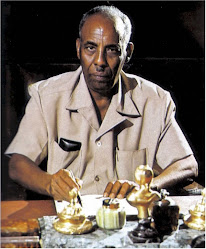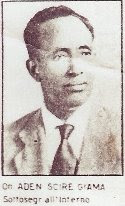Full Name: Abdiweli Sheikh Ahmed Mohamed
Date/Place of Birth: 1959, Bardhera, Somalia
Nationality: Somali and Canadian (dual citizenship)
Marital status: Married with children
Work and Residence Address: Jeddah, Saudi Arabia
Telephone: +966-5-68963675Personal Email: weli46@yahoo.ca
3. LANGUAGE PROFICIENCY
Somali (mother language), English (Fluent), Arabic (Fluent), Italian (Fluent), and
French (Good)
4. SELECTED EMPLOYMENT SUMMARY AND EXPERIENCE
2010-Present: Senior Agriculture and Rural Development Officer at Islamic Development Bank (IDB) – An International Multilateral Development Bank based in Jeddah, Saudi Arabia
Some of the achievements include the following:
· Developed East African Regional Dry land Program for IGAD member countries. This is a multi-donor funded initiative worth of US$ 280 million with the objective of improving food security, reducing vulnerability and building resilience of the resource-poor populations in the dry land regions in Eastern Africa. Currently supporting the formation of the Global Dry land Alliance, an initiative spearheaded by the Crown Prince of the State of Qatar
· Developed National livestock and fisheries development programs for Cameroon and Mozambique. The total financing of these programs is about US$ 100 million.
· Led the initiation of Islamic Development Bank Group Trust Fund Program for Somalia, in collaboration with Organization of Islamic Cooperation (OIC), Government of Turkey and Arab Financial Institutions. The objective of the Trust Fund is to mobilize and raise funds for the social and economic reconstruction of Somalia.
· Managed and implemented a project portfolio covering more than 20 countries in Middle East, Asia, and Africa. The total financing of the portfolio is US$ 500 million.
· Team leader for the development of Islamic Development Bank Group’s Agriculture and Rural Development Strategy with emphasis on livestock, pastoralism and fisheries.
2007-2009: Senior Livestock and Pastoralism Advisor to COMESA (Common Market for Eastern and Southern Africa), based in Lusaka with offices in Nairobi and Addis Ababa.
Some of the achievements include the following:
· Co-founded the Alliance of Commodity Trade for the Eastern and Southern Africa (ACTESA). This involved, among others, trade negotiations and signing of agreements between countries in the region.
· Organized Ministerial level trade negotiations that facilitated economic and trade partnerships between COMESA and GCC member countries.
· As lead development expert, assisted COMESA member countries in implementing the Comprehensive African Agricultural Development Program (CAADP)/NEPAD, under the auspices of the African Union, for the Development of Africa (NEPAD).
· Designed and implemented COMESA flagship development initiatives including COMESA Food Security and Safety Nets Program.
2003-2006: Program Manager at African Union (AU)-IBAR – Red Sea Livestock Trade Commission, based in Nairobi with offices in Djibouti and Dubai
Some of the achievements include the following:
• Developed and implemented Djibouti Regional Livestock Export Facility (DRLEF)
Led the design and implementation of USAID funded Regional Program on Enhanced Livelihoods for Pastoral Areas (RELPA)
• Facilitated GCC-Horn of Africa inter-regional livestock trade dialogue which resulted in the lifting of 15 years livestock export ban
• Organized and convened Regional Livestock Trade Fairs for IGAD member countries in Dubai, Yemen, and Egypt which mobilized financial resource and promoted trade partnerships
• Initiated, developed and managed East Africa Regional Livestock Export Facilities
1998-2003: University of Ottawa and Bank of Canada, based at Ottawa, Ontario, Canada
• Analyst in International Development and Trade Economics
• Research Associate
1991-1998: CEO – MISK Enterprises with offices in Nairobi, Djibouti and Sana’a.
Some of the achievements include the following:
• Consulted EC funded meat development project in Southern Somalia
• Consulted USAID funded Somalia/Kenya livestock Cross Border Trade Support Project
• Lead export enterprise of Somali livestock to Egypt
19984-1990: Director General – Livestock Marketing and Health Agency, Mogadishu, Somalia
Some of the achievements include the following:
• Established and maintained livestock trade agreements with major Somali livestock export markets.
• Established livestock marketing and health regulations, polices and strategies
• Mobilized donor funding amounting US $ 220 million for development of livestock marketing infrastructure and institutions in North West, Lower Juba and Lower Shabelle.
• Facilitated trade protocols with Egypt, Kingdom of Saudi Arabia, Algeria, Yemen, United Arab Emirates and Qatar
• Conducted a series of studies on promotion and diversification of Somali exports
• Strengthened the capacity of livestock traders and associations
5. EDUCATIONAL QUALIFICATION AND PROFESSIONAL TRAINING
• Ph.D. Candidate in International Trade and Development. University of Ottawa, Canada
• M.A. in Economics, University of Ottawa Canada
• Diploma in Computer Programming: Algonquin College, Ottawa, Canada
• Diploma in Animal Health Management, USDA, APHIS
• Diploma in Project planning and appraisal –SIDAM
• Diploma in Project management, USDA
• Lauria in Economics – Somali National University, Mogadishu.


















.jpg)










